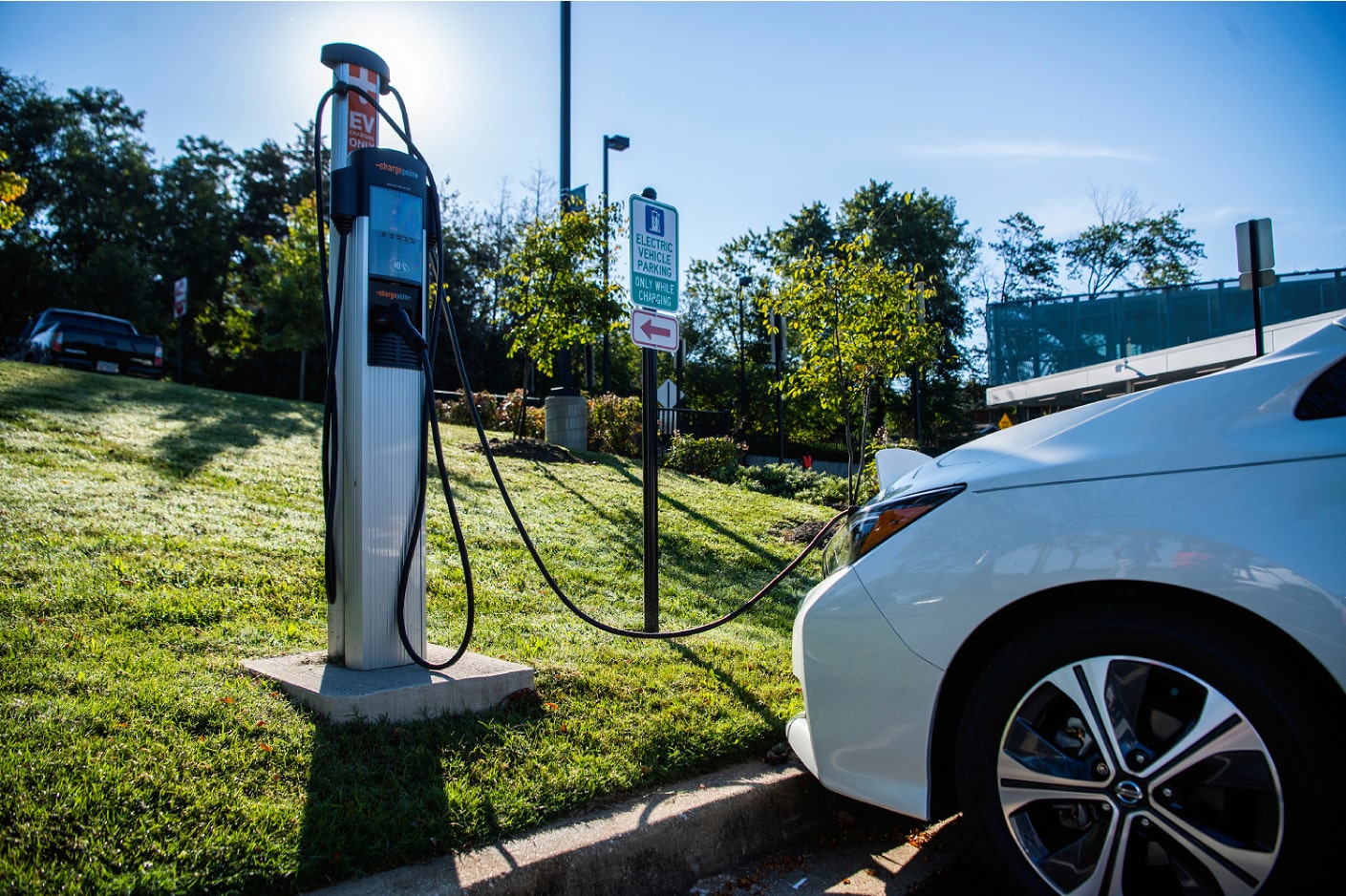Green or eco-conscious charging is the sustainable and environmentally responsible electric vehicle (EV) charging approach. This concept is firmly grounded in minimizing the carbon footprint, reducing greenhouse gas emissions, and promoting the use of clean energy sources associated with EVs. It involves using renewable energy sources, such as solar or wind power, for recharging electric vehicles.
Electric Vehicles & Eco-Friendliness
The growing adoption of electric vehicles (EVs) and advancements in EV service signifies a substantial shift toward a more environmentally friendly and sustainable automotive industry. EVs are renowned for their remarkable capacity to significantly reduce greenhouse gas emissions and decrease our reliance on fossil fuels, providing a substantial environmental benefit. This reduction in emissions plays a pivotal role in mitigating environmental impacts, aligning with the broader objectives of cleaner and greener transportation.
EVs also offer other benefits, including decreased noise pollution and the absence of tailpipe emissions. These factors combine to create a cleaner and quieter urban environment, improving city residents’ overall quality of life.
The eco-friendliness of EVs is not determined solely by the vehicles themselves; the source of electrical energy used for charging plays a crucial role in their overall environmental impact. Implementing sustainable energy production practices, such as harnessing solar energy and employing other green power solutions, can further enhance the ecological benefits of EVs. This transition towards cleaner energy sources in the EV charging process positions EVs as sustainable solutions, contributing positively to our efforts to combat climate change and marking a significant step towards a cleaner and more sustainable future. By using green energy sources for charging, we reduce greenhouse gas emissions and directly contribute to environmental preservation.
Green charging encompasses the efficient management of clean energy resources, ensuring minimal waste in the charging process. Advanced technologies like smart grids and energy-efficient chargers play a crucial role in promoting eco-friendly EV charging and further reducing the release of greenhouse gases, thus magnifying the environmental benefits of electric vehicles. By adopting green charging practices, we substantially contribute to fostering a cleaner and more sustainable future for our transportation systems while actively addressing the pressing issue of climate change, thereby safeguarding our planet for future generations.
Innovating Sustainable Infrastructure
Innovation is the linchpin for promoting sustainability in electric vehicle (EV) charging infrastructure. The ever-advancing landscape of technology is ushering in transformative changes. These developments are evident in several key areas:
1.Faster Charging Methods
One of the notable strides in sustainable infrastructure is the acceleration of charging speeds. EV charging stations are becoming more adept at delivering rapid refueling, minimizing wait times, and enhancing the convenience of electric vehicle ownership.
2.Smarter Energy Management
The incorporation of intelligent energy management systems is revolutionizing the charging process. These systems optimize energy distribution, reducing waste and inefficiency. As a result, the environmental impact of charging EVs is considerably reduced.
3.Solar-Powered Charging Stations
A significant leap toward sustainability is witnessed in deploying solar power
charging stations. Harnessing the sun’s energy powers EVs and contributes to a greener, cleaner environment.
4.Energy-Efficient Chargers
Energy-efficient chargers are becoming more prevalent in the market. These chargers minimize energy consumption, reducing the carbon footprint associated with EV charging.
5.Integrated Electrical Grid Management
The integration of power grid management systems ensures a seamless and reliable flow of electricity to EV charging stations. This synchronized approach optimizes energy use, promotes grid stability, and supports a sustainable charging infrastructure.
The collective effect of these innovative solutions and material advancements is not only the reduction of environmental impact but also the establishment of a more accessible and convenient ecosystem for electric vehicle owners. Sustainable infrastructure developments, including public charging infrastructure, serve as the cornerstone of a future where green charging practices become the standard, aligning harmoniously with the global commitment to sustainable and environmentally responsible solutions.
Policy Support For Green Charging
Government policies and regulations profoundly influence the evolution of green charging within the electric vehicle (EV) industry. This influence is multifaceted and can be broken down into several critical aspects.
1. Incentives and Promotion
One of the primary roles of government policies is to provide incentives for adopting eco-friendly technologies in the EV charging sector. These incentives include tax credits, rebates, and subsidies for individuals and businesses investing in sustainable charging infrastructure. Such financial support makes green charging more economically attractive and encourages widespread adoption, benefiting customers and the environment.
2.Setting Industry Standards
Policymakers also contribute by establishing clear and consistent industry standards. These standards ensure that charging networks are efficient, reliable, and compatible across various platforms. Standardization streamlines the integration of green charging practices and creates a more user-friendly environment for EV owners.
3.Carbon Emission Reduction
One of the overarching objectives of green charging policies is to reduce carbon emissions. Governments promote using renewable energy sources, such as solar and wind power, for EV charging. By doing so, they significantly reduce the carbon footprint associated with electric vehicles. These efforts align with broader environmental goals and sustainable practices.
4.Accessibility and Affordability
Policies are instrumental in making green charging accessible and cost-effective. They support expanding charging networks, ensuring EV owners have convenient access to charging stations. Additionally, through targeted regulations, governments aim to keep charging costs reasonable, further promoting the adoption of eco-friendly EV charging solutions.
Governments contribute substantially to developing a sustainable and environmentally responsible EV charging infrastructure by proactively supporting well-crafted policies. Their multifaceted approach, encompassing incentives, standards, emission reduction, affordability, and consideration of customers, serves as a driving force in the global transition towards green charging practices.
Adoption Trends Of Electric Vehicles
The adoption of electric vehicles (EVs) is rising, reflecting a shift in consumer preferences and a growing awareness of environmental concerns. As the market for EVs expands, so does the variety of models and charging infrastructure. Consumers are increasingly inclined toward EVs due to their reduced carbon footprint, lower operating costs, and government incentives. Moreover, automakers are investing in technology and design, making EVs more appealing. Market trends indicate a steady growth in EV adoption, with a notable surge in hybrid and all-electric models. As more people choose EVs, it paves the way for a more sustainable and eco-conscious transportation future.
Renewable Energy In EV Charging
Integrating renewable energy sources into the fabric of EV charging infrastructure represents a pivotal stride toward fostering sustainability in transportation. This transformative endeavor encompasses various facets and merits a deeper exploration.
1.Harnessing Solar and Wind Power
Innovative approaches are rapidly emerging, enabling the utilization of solar panels and wind turbines to harness renewable energy. When installed at charging stations, solar panels capture the sun’s energy, converting it into electricity. Similarly, wind turbines generate power by harnessing the wind’s kinetic energy. Both sources contribute to the generation of clean, sustainable energy.
2.Minimizing the Environmental Footprint
Deploying renewable energy in significant EV charging minimizes the environmental footprint of this process. By relying on clean, renewable power sources, the carbon emissions associated with electricity generation are substantially reduced. This pivotal reduction in greenhouse gas emissions aligns with global sustainability goals and fosters a greener, cleaner environment.
3.Cost-effectiveness and Reliability
Renewable energy sources offer notable cost-effectiveness and reliability advantages for charging infrastructure. As technology advances, the cost of solar panels and wind turbines decreases, making adopting these solutions increasingly affordable. Additionally, renewable energy sources are renowned for their reliability, providing consistent power for charging stations and reducing the need for grid-based electricity.
4.Demonstrating Commitment to Sustainability
The integration of renewable energy into charging stations is a testament to the relentless commitment to reducing the carbon footprint of electric vehicles. It underscores a dedication to sustainable practices and resonates with the global transition towards environmentally responsible transportation solutions.
As technology progresses, the broader implementation of renewable energy solutions within the EV charging landscape is all but inevitable. This promises to reduce the environmental impact of electric vehicle charging and signifies an enduring commitment to greener and more sustainable transportation options.
Future Prospects Of Green Charging
The future of green charging for electric vehicles within clean transportation holds promise and challenges. As technology evolves, we anticipate more efficient charging methods, faster charging times, and enhanced energy storage solutions facilitated by intelligent technologies. Challenges will include infrastructure development, including expanding the charging station network and increasing the use of renewable energy sources. Policy changes and government support will play a crucial role in shaping the future of green charging. As consumers become more environmentally conscious, adopting eco-friendly practices will become the norm. The end of green charging within clean transportation is poised for continued growth, offering opportunities to reduce our carbon footprint and embrace sustainable transportation solutions.
Post time: Nov-09-2023

 Portable EV Charger
Portable EV Charger Home EV Wallbox
Home EV Wallbox DC Charger Station
DC Charger Station EV Charging Module
EV Charging Module NACS&CCS1&CCS2
NACS&CCS1&CCS2 EV Accessories
EV Accessories

